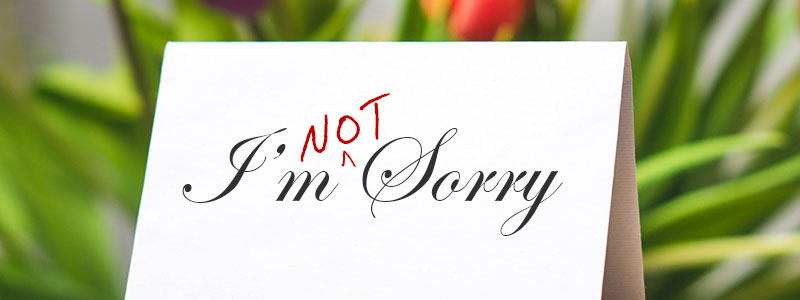What to Say Instead of “I’m Sorry” After a Car Accident
To many people, especially in the Midwest, saying, “I’m sorry,” is second nature. It doesn’t even matter if whatever happened wasn’t our fault — the words “I’m sorry” are uttered almost like a spell to try to diffuse any tense situation. Whether someone ran into you in the hallway, held the door open for you […]

February 9, 2018

To many people, especially in the Midwest, saying, “I’m sorry,” is second nature. It doesn’t even matter if whatever happened wasn’t our fault — the words “I’m sorry” are uttered almost like a spell to try to diffuse any tense situation. Whether someone ran into you in the hallway, held the door open for you an awkwardly long time, or reached for the last piece of pizza at the same time you did, the first words we often use in any uncomfortable situation are “I’m sorry.”
It’s no wonder, then, that the first words out of people’s mouths after a car accident are often, “I’m sorry.” Even if the accident was the other driver’s fault, we still like to apologize for just how awkward or tense the situation is.
However, apologizing after a car accident can actually do more harm than good.
The Rules of Fault

Indiana is a fault state. That means that you may be able to recover damages against the other driver’s insurance company if they’re found to be more than 50 percent at fault for causing the accident. Whatever percentage of fault you’re found to be will affect the amount you can recover from the other driver’s insurance.
For example, if you have $10,000 in damages and you’re 15 percent at fault, you could recover $8,500 from the other driver’s insurance company.
Fault, however, can be tricky to determine. A police report can shed light on what happened, but it isn’t the final word on who gets most of the blame. Unfortunately, many car accident claims end up devolving into he-said, she-said.
Safe Phrases to Say at the Accident Scene

If your case may end up relying on what you and the other driver said, it makes sense to be extremely careful with your words at the scene of the accident. The insurance company may take a simple “I’m sorry” said out of Midwestern politeness and twist it into an admission of fault to use against you in court.
But it’s hard to break the habit of saying, “I’m sorry.” What else is there to say? How else can you express your feelings of awkwardness and empathy?
“Are you okay?”
If you want to express concern for the other driver, a safe phrase to use is, “Are you okay?” Asking about a person’s state of being after an accident is not only polite, but also a good way to determine the kind of help you need to call to the scene. You should always call the police after an accident, but it’s helpful to know whether or not you also need to call for an ambulance.
“Are you okay?” also expresses a kind of solidarity. If the person who hit you seems really nice or even apologetic, you may not want to meet that emotion with stiff professionalism. It’s okay to express that you care that they’re not hurt or, if they are hurt, that they get the treatment they need.
“I hate that we’re in this mess.”
Again, this is a phrase that can help acknowledge some of the intense emotions you may be feeling after the accident. Often, people will say, “I’m sorry,” almost as a synonym for, “I wish this didn’t happen.” You can express that frustration to the other driver with a simple phrase that relates to the accident in general without taking ownership for what happened.
Something general like, “I hate that we’re in this mess,” is also less volatile than something that places the blame directly on the other driver. If the other driver is being cooperative, you don’t need to shout, “I can’t believe you did this!” or express all of your anger to the police when they arrive. Instead, remain calm and simply explain what happened to the police officers. Refrain from calling the other driver names or questioning their intelligence. If you have to express your anger, express it in regard to the situation in general, not directly at a specific person.
“What happened?”
Asking the other driver, “What happened?” is a good way to gauge whether or not you have the same perspective. If the other driver immediately owns up to it and says, “I was speeding,” or, “I forgot to stop,” or, “I just wasn’t paying attention,” you can report that to the police when they arrive. If the other driver asks you questions that have a clear answer that doesn’t put you at fault for the accident, you can answer them. For example, if they say, “Why were you stopped anyway?” you can explain, “I had a red light.”
However, be very careful if the other driver asks you, “What happened?” Don’t speculate. If you genuinely aren’t sure how the accident occurred, simply say, “I don’t know.” If you know you’re not at fault, you can give your version of events, but make it clear that you were driving responsibly and following all traffic laws. If the other driver disagrees, simply tell them you’re going to report your version of events when the police officer arrives and they can figure it out later. If you’re afraid you might be at fault, simply stick with, “I don’t know.” You don’t owe the other driver any direct explanations.
Help from an Indiana Car Accident Lawyer
If you’ve been injured in a car accident, Hensley Legal Group may be able to help. Call us today or contact us online for a free case review.